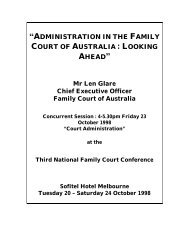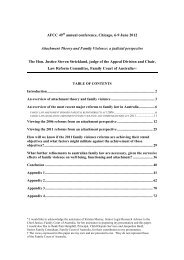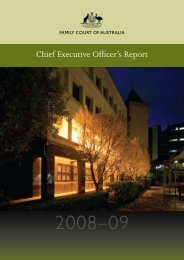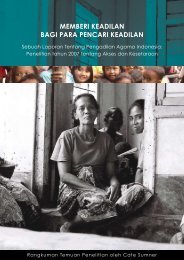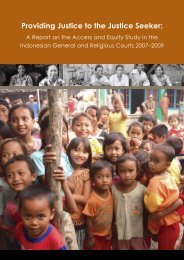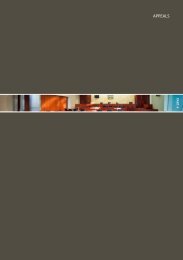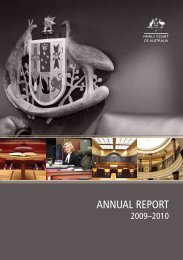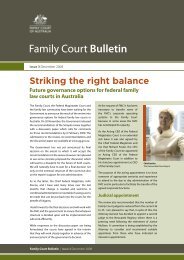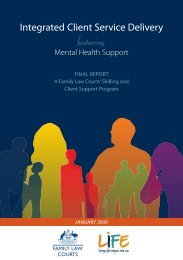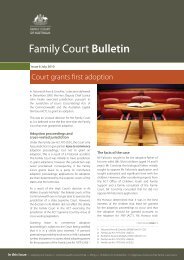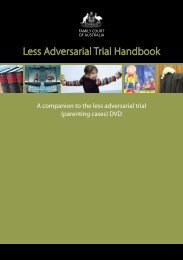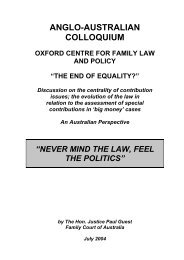Annual report [1997-98] - Family Court of Australia
Annual report [1997-98] - Family Court of Australia
Annual report [1997-98] - Family Court of Australia
Create successful ePaper yourself
Turn your PDF publications into a flip-book with our unique Google optimized e-Paper software.
The <strong>Family</strong> <strong>Court</strong> <strong>of</strong> <strong>Australia</strong> – annual <strong>report</strong> <strong>1997</strong>-<strong>98</strong><br />
able to meet time standards throughout some months <strong>of</strong> the year, it should be noted that<br />
urgent requests for appointments were able to be met within the time standard in all registries.<br />
Single interviews in violence cases<br />
In keeping with the <strong>Court</strong>’s <strong>Family</strong> Violence Policy, single interviews are <strong>of</strong>fered when<br />
there has been a history <strong>of</strong> violence in the relationship and one <strong>of</strong> the parties indicates they<br />
are worried about their physical safety and are afraid <strong>of</strong> attending a joint interview with the<br />
other party. This option is <strong>of</strong>fered in all appointment letters, information sessions and<br />
through notices in waiting rooms. There were 8632 cases where separate interviews were<br />
requested and held because <strong>of</strong> family violence.<br />
Information sessions<br />
These sessions are held regularly in all registries to inform customers <strong>of</strong> what to expect<br />
when they come to <strong>Court</strong> and to prepare them for any conciliation counselling (children’s<br />
matters) or conciliation conferences they may attend with registrars (financial matters). In<br />
smaller registries they are <strong>of</strong>fered on an ‘as needed’basis. These sessions are also provided<br />
in some remote areas through the visiting counselling services. In <strong>1997</strong>-<strong>98</strong>, 1085 hours<br />
were devoted to information sessions.<br />
Community liaison work<br />
In the spirit <strong>of</strong> s43 <strong>of</strong> the <strong>Family</strong> Law Act 1975, the Counselling Service has, from the<br />
beginning, sought to be proactive in reducing undue personal and interpersonal conflicts<br />
arising from marital breakdown and to assist other helpers to cope with problems arising<br />
from their client’s marriage breakdown to help avoid the demands placed on services when<br />
conflicts reach crisis point. The Counselling Service’s community work role is a major<br />
expression <strong>of</strong> this aim. Over 3313 hours were spent on this work – down 15% on <strong>1997</strong>-<strong>98</strong>.<br />
The types <strong>of</strong> people contacted included: students, practitioners in allied pr<strong>of</strong>essions<br />
(including, among others, doctors, nurses, police, welfare workers, teachers, interpreters,<br />
lawyers), members <strong>of</strong> community organisations (including refuges and shelters, citizen<br />
advice bureaux, self-help groups, migrant resource centres, government departments, marriage<br />
counselling organisations and community health centres) as well as the general public<br />
through public meetings and the media.<br />
Customersurveys<br />
During <strong>1997</strong>-<strong>98</strong> the <strong>Family</strong> <strong>Court</strong> published a preliminary <strong>report</strong> on ‘Perceptions <strong>of</strong> the<br />
Clients <strong>of</strong> the <strong>Family</strong> <strong>Court</strong> <strong>of</strong> <strong>Australia</strong> on the Location <strong>of</strong> Primary Dispute Resolution<br />
Services’ in its response to the Attorney-General’s Department Discussion Paper on<br />
‘Primary Dispute Resolution Services in <strong>Family</strong> Law’. This preliminary <strong>report</strong> was based<br />
on a survey <strong>of</strong> 553 conciliation counselling and mediation customers who attended the<br />
<strong>Court</strong> Counselling Service and Mediation Service and addressed some <strong>of</strong> the issues raised<br />
in the Attorney-General’s Discussion Paper concerning the accessibility <strong>of</strong> services, preference<br />
as to the location <strong>of</strong> services, the likelihood <strong>of</strong> court-based services increasing litigation,<br />
perceived benefits associated with proximity to the court and legal system, confidence<br />
in the <strong>Court</strong>’s services and issues <strong>of</strong> safety and cost.<br />
29


![Annual report [1997-98] - Family Court of Australia](https://img.yumpu.com/37244799/34/500x640/annual-report-1997-98-family-court-of-australia.jpg)
